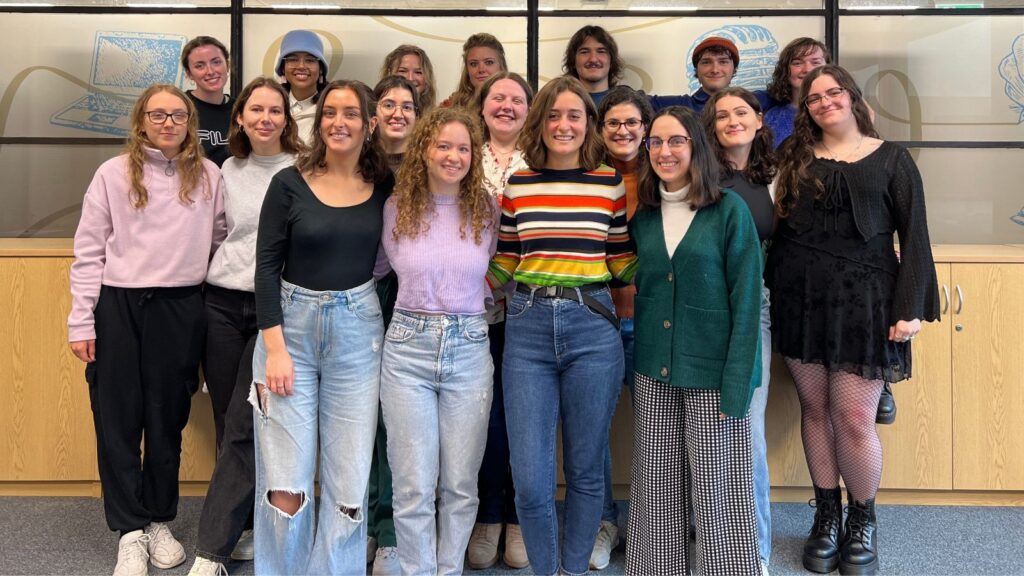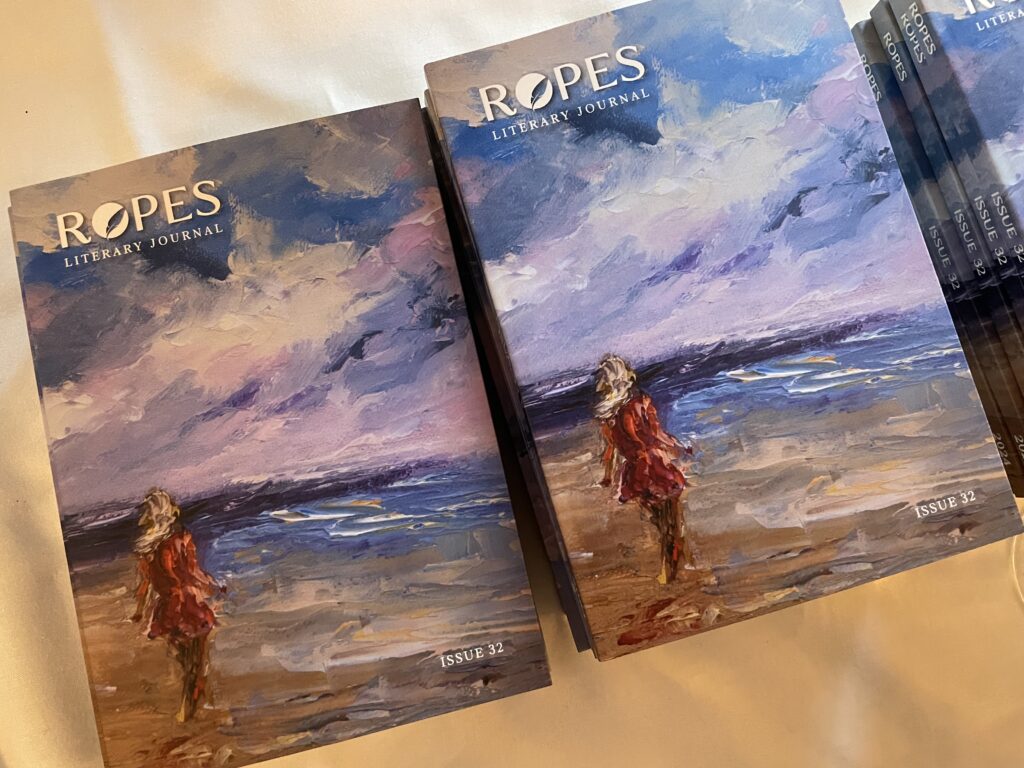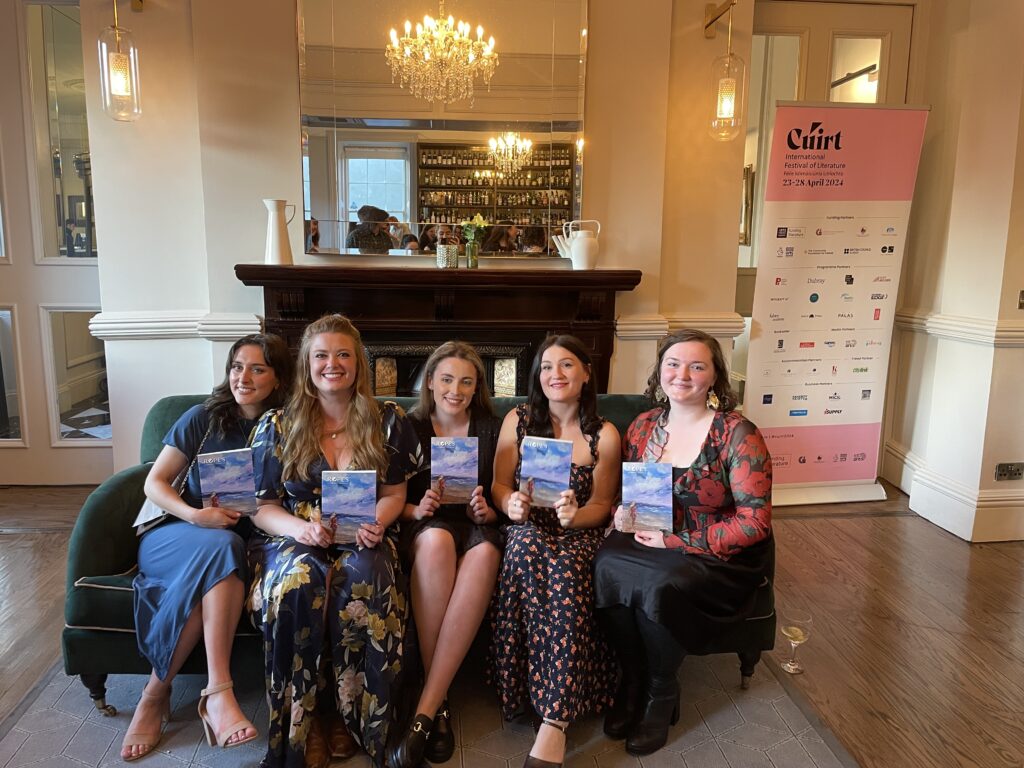
ROPES—Light and gravity in a vital Irish publication, in a flourishing journal scene
by Blaise Gilburd
The ROPES Literary Journal was established in 1991, originally as the University of Galway’s Review of Postgraduate English Studies, and this year will be celebrating its 32nd issue. What began as a review of academic works focused on Irish politics, history, and literature, has developed into an established literary journal since the first piece of fiction was featured in 1998.
The journal is produced annually by the University of Galway’s MA in Literature and Publishing. The MALP also works closely with the University’s MA in Writing, encouraging writing students to submit to that year’s journal. As a result, we produce an inspired collection in aid of our chosen charity. This year, we will be supporting Galway Simon Community, a non-profit organization that works to prevent homelessness and provide support for those who are currently living unhoused.

It is on a voluntary basis that each year’s class works to bring a new edition of ROPES together. The experience provides some of the most practical skills and applied experience that one can gain without working directly in the publishing industry. I can say with full honesty that the production of the magazine was a truly challenging process. To meet a group of total strangers and almost immediately begin the production of a literary journal is no mean feat.
The only option available to us was to learn on the job, and the learning curve was steep, but the skills and confidence gained were invaluable
This is one of the greatest strengths of the journal as a learning experience, to begin to work together as quickly as possible, and to somehow build a unified creative vision across such a relatively large group. The only option available to us was to learn on the job, and the learning curve was steep, but the skills and confidence gained were invaluable.
The magazine publishes a wide variety of fiction, nonfiction, poetry and visual arts. True to the ethos of what a student-led journal should be, ROPES is open to the full expanse of forms that literature may appear in.

Over the years, an array of personal essays, social critiques and educational pieces have been published alongside both traditional and highly experimental forms of prose and poetry. What appears is solely what the editors believe to be great writing, and that is the major guiding principle, though some past cohorts have chosen a theme to help direct their vision. Whilst still being a deeply Irish and Galway-focused publication, aware and connected to the student body, we strive for an international perspective, and this year’s issue features writers from Brazil, the United States, India, Germany and England. Such a web of perspectives is also reflected within the team who produce this magazine, with some of this year’s members travelling to Galway from the United States, Venezuela, Portugal, Romania and many other counties and countries.
personal essays, social critiques and educational pieces have been published alongside both traditional and highly experimental forms of prose and poetry
Our main goal is to offer an inclusive space from which established and emerging writers and artists, especially underrepresented voices, can exhibit their work. In past issues ROPES has published Kevin Higgins, Claire Hennessy, Mike McCormack, Colm Tóibín, and Nuala O’Connor, alongside a whole host of new names who have gone on to do incredible things in the world of writing. In this year’s edition alone, we feature an extract from a novel currently being written by Maggie Armstrong, who only recently released Old Romantics, her brilliant debut collection of short stories, to great acclaim.
Ireland is undoubtedly experiencing a golden age for the literary journal, with new publications springing up frequently. There is enormous energy behind such journals, and ROPES has long been a stalwart of the scene, holding a respected place in the ranks of many of the oldest literary journals in Ireland. It is wonderful to see so many new publications appearing, and incredibly reassuring to see that even during these difficult times, the funding is still there to allow this scene to thrive.
The importance of such magazines cannot be understated: they are a vital cornerstone of the Irish literary ecosystem. So many of our greatest authors, from Sally Rooney to Kevin Barry, have had their start in these publications. We have witnessed first-hand their importance in nurturing the future talent of Irish literature. Working with new writers during the editorial process we had first-hand interactions with our authors, advising them and guiding them towards what would be their finalised pieces, closely seeing how their own awareness about their writing grows.
It is wonderful to see so many new publications appearing, and incredibly reassuring to see that even during these difficult times, the funding is still there to allow this scene to thrive
As a writer myself I am fully aware of the value of literary journals. It provides a more approachable entry point for writers into the world of publishing. To submit a piece to a magazine with your ambitious hopes in tow is far less intimidating than putting together a full manuscript to send off to a publisher or agent. It is the beginning for so many writers, where they can grow their confidence, and grow more resilient to the steady ping of rejections. This is a space within which it is ideal for the emerging writer to develop their work.
With the trove of journals emerging at every level and across the country, the scene seems more open than ever to welcome all writers into the fold. To ensure that Irish writing continues to thrive it is vital that such a scene continues, to develop the skills and encourage the new talent breaking through.
ROPES exists in an exceptional position to help many writers develop at the very earliest stages of their careers, whilst also providing a brilliant opportunity for the next generation of publishers to gain experience in the process of production. If we wish to maintain the incredible run of acclaimed Irish works, we need writers to continue creating, and to fill the scene with light and gravity, we need works enlivened by a community sparking great vitality off one another.











